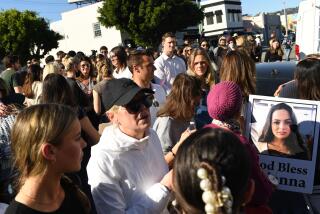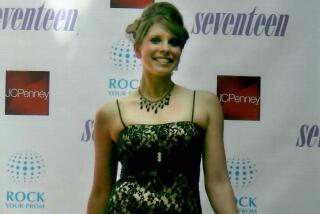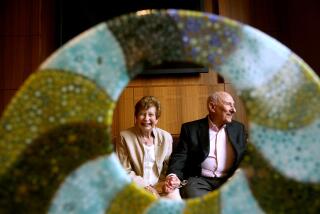Lost UCLA cadavers’ final chapter
Helen Yoshikawa walked into the courtroom in downtown Los Angeles armed with four pages of talking points. Kathy Pahlow came loaded with questions.
They knew they’d already lost their case, but this was their one chance to address UCLA’s lawyers — to explain that their dead parents were more than body parts and their failed lawsuit about more than money.
“I wanted to have the satisfaction,” Yoshikawa said, “of looking them in the eye and telling them who we were. I know some people would say it’s a lost cause, but it didn’t feel that way to me.”
Pahlow and Yoshikawa were among dozens of family members who sued UCLA after a scandal erupted over its body donation program. Thursday’s hearing was the final step in a drama that began in 2004 with the discovery that bodies willed to UCLA for medical research were, essentially, being sold on the open market.
The scheme was a clandestine collaboration between the willed-body program’s director and a private tissue broker, who told The Times he retrieved the corpses from UCLA’s cold storage room, cut them into pieces with power tools and hauled them off, packaged in coolers. He made more than $1 million providing the cadavers and body parts to pharmaceutical and medical firms.
Both men were sent to prison, and the university’s body donor program temporarily shut down. News coverage and legal proceedings had exposed embarrassing problems in macabre detail: Unsanitary conditions, overcrowded cadaver rooms, a tracking process so disorganized that UCLA couldn’t account for hundreds of bodies.
The body of Yoshikawa’s mother, Ruth Helen Lance, was one that disappeared.
Yoshikawa told the lawyers her mother’s story: She grew up poor during the Great Depression, struggled in school with learning problems, was widowed two weeks before her only child was born and cleaned houses and cared for others’ children to raise her daughter and put her through college.
She decided before she died in 2002 to donate her body to the university. “She liked to think she’d help educate some young doctor,” recalled Yoshikawa, a retired third-grade teacher who graduated from UC Berkeley. Her stepfather also bequeathed his body to UCLA when he died in 2000.
“They didn’t have good lives,” Yoshikawa said. “There were lots of obstacles and disappointments…. They saw this as a way to do something good, to be more in death than they were in life.” Instead, she told the assembled lawyers, her stepfather was “chopped into ice-chest-size pieces and illegally sold to the highest bidder.”
And her mother, who “felt so proud that despite a difficult life, she had something special to offer in death … was so worthless and unimportant to UCLA that they have no record of what happened to her.”
::
I wasn’t allowed in the courtroom on Thursday; it was a private lawsuit settlement conference — a formality in a case that had already been deemed a non-starter.
Dozens of families had sued the UC Regents, alleging that UCLA violated its agreement to use the bodies for medical research and treat the remains with dignity. But the state Supreme Court ruled last year in one of those cases that the university had no legally enforceable duties to the families; that its agreement was with the deceased.
That left survivors with two choices: agree to dismiss their lawsuits or lose in court and pick up the bill for UCLA’s legal fees. Most signed off; only three of the 300 original plaintiffs bothered to show up Thursday in court.
“I think most people just decided ‘that’s enough’ and gave up,” said Yoshikawa. She felt better for going, she said. “I knew it wasn’t going to change the outcome, but somebody had to speak for the people who had their ‘gift of knowledge,’ as UCLA called it on their website, dishonored and abused.”
Pahlow is still struggling to figure out how she feels. The body of her mother, Jacqueline Brown, has also not been accounted for. “I wanted to know how this could happen. You think ‘This is UCLA; it so prestigious.’ And they have no responsibility?”
I asked her to tell me about her mother. There was silence, then a rush of thoughts; words stumbling over one another.
She was born in Trinidad and traveled the world. “She made friends of every age in every place she visited.” She had three children, she lived in Seattle, she died of pulmonary fibrosis, she was always laughing. She wanted to be an organ donor, but her illness made that impossible. She left her body to UCLA because she spent her last six months in Redondo Beach, living with Pahlow, her oldest daughter.
I spoke with Pahlow’s brother-in-law, who lives near Atlanta. Bud Turner is married to Ann, Jacqueline’s other daughter. “Nan,” their nickname for grandma, spent nine months living with them, in constant pain but “always in a good mood,” he said.
The lawsuit “was never about the money,” he said. “It’s the moral issue. Maybe UCLA won the legal decision; maybe they had a better case. But to take all these people who had a real story, a real loving family … and they get lost in this quagmire of legalism.”
The Body Donor program, meanwhile, is back in business, with safeguards including better locks on cadaver labs, more explicit consent forms for donors, more freezer space for specimens, and tiny electronic transmitters embedded in cadavers to track them.
Nan’s daughters have a hard time letting go “because there’s no resolution. All anybody wants is to have a warm memory of someone who’s gone. Here, there’s nothing you can take away that’s not borderline grotesque. Now whenever her name comes up, it’s like everybody gets quiet,” Turner said.
“Kathy keeps saying ‘Do you think Mom would think I’m doing the right thing?’ I think she’s still kind of looking for her mom — who was a devout Catholic — to say, ‘You’ve done a good job. I can rest in peace now.’
“I told her just by showing up, your mom would be proud. You’ve done the right thing.”
More to Read
Sign up for Essential California
The most important California stories and recommendations in your inbox every morning.
You may occasionally receive promotional content from the Los Angeles Times.










